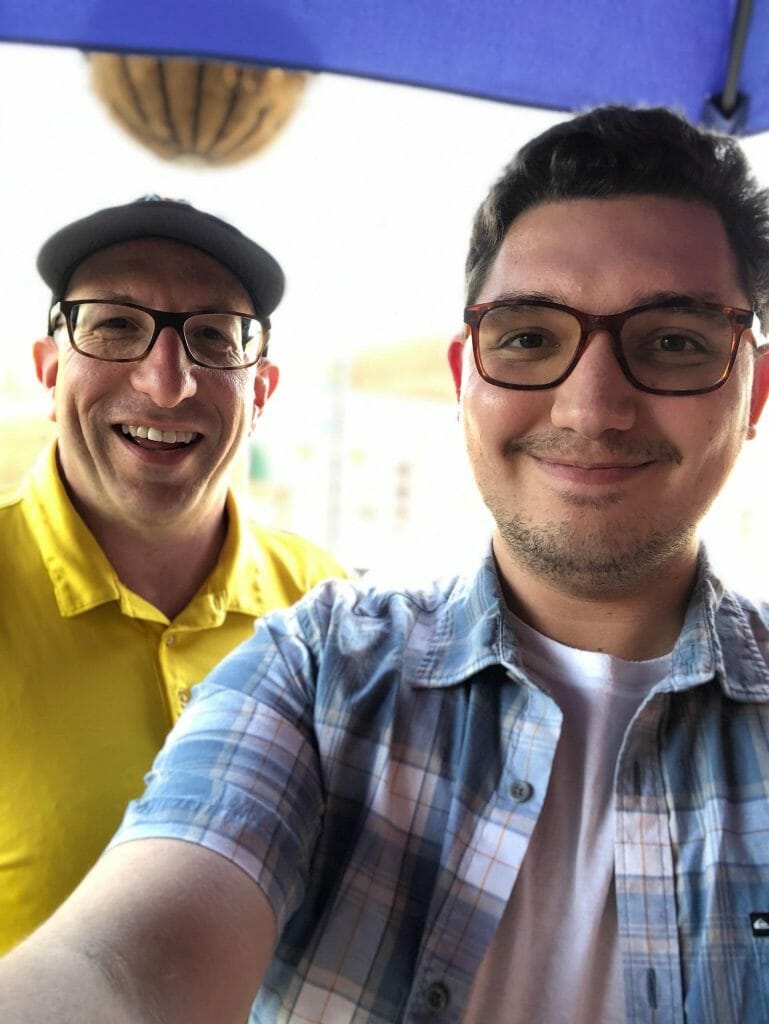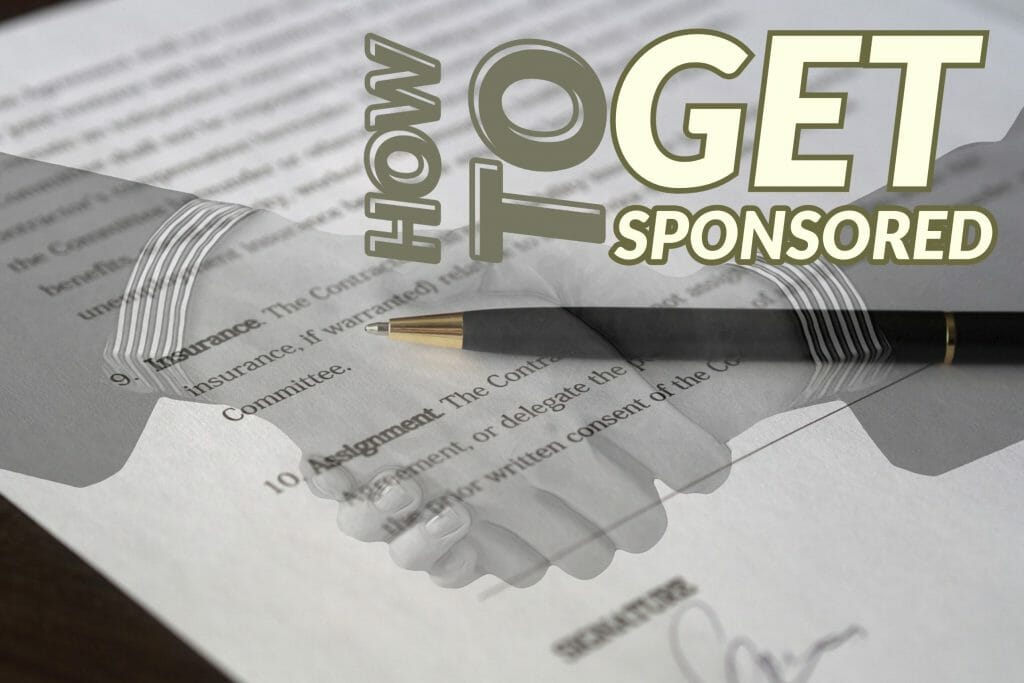Originally published at: https://discgolf.ultiworld.com/2021/05/13/a-diy-guide-to-securing-a-disc-golf-sponsorship/
When it was announced earlier this year that Paul McBeth had signed a 10-year, $10 million sponsorship agreement with Discraft, even people outside the sport took notice. This was, by any reckoning, a watershed moment for disc golf. For McBeth and other players at the highest levels, sponsorship is the pathway to making a living playing the game. So, do you have to crush off the tee like Paige Pierce and drop in 50-foot putts like James Conrad to get a sponsorship? Not necessarily. With an understanding of how to create a win-win situation and reasonable expectations, lots of players, even those at the amateur level, can find a way to get a sponsor.
I started playing disc golf last summer, but having played ultimate for many years I picked up the basics fairly quickly. As I started in the sport, carding +10s on the local courses, the idea of getting sponsored didn’t even cross my mind. But as I started improving, my professional experience in sports PR and marketing kicked in, and I began thinking I might be able to work something out. Here are the steps I, an MA50 player, followed to secure a sponsorship deal.
Before You Even Start to Think About a Sponsorship
There’s plenty to do before you sign that deal. First, work on your disc golf brand. Take the easy steps if you haven’t already and get a PDGA membership, join your local club, and start playing in events. If you already have an Instagram (or other social media) account where you post pics of your family or you and your pals tailgating at the college football game, I suggest creating a new, disc golf-specific account. You want to draw followers that actually care about disc golf. The sooner you start this, the more disc golf followers you will have: a sponsor wants to see that. I started @the.understable and while it may not have thousands of followers yet, they are all disc golf-related followers.
I also thought about how I want to be seen when on the course or at events. Collared golf shirt, golf shorts, shoes, and hat appropriate for the sport. That’s how I chose to represent myself to show that I wouldn’t negatively reflect the sponsor’s brand. I may play like an amateur, but I look like a professional.
Survey the Landscape
When I decided I wanted to attract a sponsor, I researched the local scene. I had no delusions that a regional or national sponsor would be interested in me at this stage, so I focused on what was happening here in the Triangle in North Carolina. Earlier this year, Peak Discs launched their online retail store, with headquarters just 15 minutes away from where I live. I spent a lot of time looking at their website, understanding what the brand was about, and making sure it seemed like it might be a good fit.
I connected with the owner several times as well, reaching out just to introduce myself and find out more about his company. We even played a round together, building rapport and just getting to know each other. Having years of experience as a PR and marketing professional, I’m bringing relevant experience when I say, “Hey, I think I can help you out.” I don’t think having that professional experience is essential, but I do acknowledge that it helped me.
The key is: do your homework, understand who you are reaching out to and what they might need to reach their business goals. Ultimately, we reached an agreement that includes partial sponsorship of apparel and tournament registration fees.
Create the Win-Win
This is the most important part. No company — not Innova, not your local Italian restaurant, not Nike — is sponsoring a player out of the goodness of its heart (unless your aunt owns that restaurant). If you’re coming at this from the perspective of, “Sweet! Free gear, apparel, discs, and I’ll get my tournament fee covered,” you’re coming at it the wrong way. Yes, some of that may be an outcome, but when you are looking for a sponsor, your first thought has to be, “How can I help them?” The owner of Peak Discs, Cameron Small, told me several people had approached him regarding sponsorships and they had all led with what they wanted from him. Unless your name is Eagle McMahon, that’s probably not going to fly.
 The author, Rick Liebling, left, and Peak Discs owner Cameron Small.
The author, Rick Liebling, left, and Peak Discs owner Cameron Small.
While not all potential sponsors are going to have the same reasons for wanting to sponsor a player, I think it can be instructive to get an idea of what they are looking for. Here’s what Cameron had to say when I reached out to him for this article:
From the sponsor’s perspective, sponsoring players is a way for companies to directly invest in players, connect with the community, and increase the awareness of their brand. You get to invest in a player that you want to support and see grow as an individual, and it’s great to always have someone to root for and follow locally during tournament season. Plus, if you sponsor multiple players, they’ll hopefully grow as a team as well. Through the players and the connections you make while sponsoring you get to become more involved in the community, which ideally leads you to give back in some way. All of this culminates in increased awareness for your brand, which is always helpful when you’re trying to grow your company. It’s a really great thing to be a part of and it helps everyone involved, and I think that’s true at all levels of sponsorship.
It’s clear that Cameron views sponsorship as a way to develop a deeper connection to the local disc golf scene — the tagline for Peak Discs is “Throw local, shop local” — and so for him, it’s not necessarily about me winning every tournament I enter, but rather helping him, a young business owner, make deeper connections in the local disc golf community. This long-term, unassuming approach aligned well with my attitude towards the game and made a relationship between Peak Discs and myself feel quite natural. As you can see by our announcement press release, neither of us is taking the sponsorship too seriously either.
So what are you providing? Sure, your results matter, but probably not that much. As an amateur player, you’re not going to be giving a sponsor airtime on Jomez or the Disc Golf Network. Instead, you need to be able to explain how you will be promoting your sponsor. That could be through social media, your participation in a local club, and being present at local course workdays. Or maybe it’s a promise to bring a bunch of your disc golf buddies to that Italian restaurant once a week.
In other words, you need to be able to show that you will be visible, vocal, and beneficial. Performing well at tournaments doesn’t hurt either. For my agreement with Peak Discs, I’ll wear branded apparel, promote Peak Discs via social media, and help with PR. In return, Peak Discs is providing a percentage of my tournament registration fees, which I receive in the form of store credit.
Read the Room
Back to the free gear and registration fees. Understand the business you are dealing with and ask yourself several questions: How much expenditure can they take on right now? Do I want this to be a one-year sponsorship or a long-term relationship? What’s a reasonable return for the value I’m delivering? These will factor into what you negotiate for. For me, knowing that Peak Discs was a startup, it didn’t make sense for me to ask for the moon. In fact, I was careful to directly ask Cameron about his comfort level every step of the way. As a result, we are very much aligned on what each side is contributing to the relationship, and neither side feels they are giving more than they are getting.
Sponsored Athletes
Across the sports spectrum, gender equity has, rightly, become a topic more frequently and openly addressed. If I were to advise a brand, I would counsel them to look at MA40 or MA50 women. They have strong social networks, are dependable, and tend to have the soft skills to match their on-course prowess.
Less talked about is how older athletes become disposable. Outside of the occasional pain management ointment or reverse mortgage ad, most athletes outside their prime aren’t seen as worthy of sponsorship. Disc golf is uniquely positioned to embrace both older athletes and ones that compete at an amateur level because disc golf isn’t yet “mainstream.”
Think of MA50 players as micro-influencers who have strong community ties and are in a peer group that likely has disposable income.
Ultimately, every player and every brand are unique, and the sponsorship agreement you secure will be as different from mine as mine is from McBeth’s. But if you do your homework, put in the effort, and focus on giving more than you get, the opportunity to call yourself a sponsored player is available to you.

